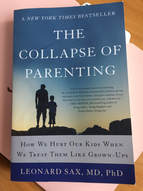Teaching & Learning
"Wisdom is of utmost importance, therefore get wisdom,
and with all your effort work to acquire understanding."
(Proverbs 4:7, ISV)
and with all your effort work to acquire understanding."
(Proverbs 4:7, ISV)
|
If you missed my last post, A Proverb A Day, take a minute to head over there and then jump into today's update.
Using the Book of Proverbs in the Communication Arts & Literature Classroom
knowledge, wisdom, instruction, understanding, humility,
working hands vs. lazy hands & discipline  Click on link to order book from amazon.com Click on link to order book from amazon.com
Last weekend I posted a book review for the book, The Collapse of Parenting: How We Hurt Our Kids When We Treat Them Like Grown-Up. (Go read it when you have a couple minutes.) In the process of reflecting on and evaluating the research and recommendations made by Leonard Sax (MD, PhD), I was again reminded of how important it is to incorporate into my classroom instruction lessons on humility, knowledge and making wise decisions through patience and discernment.
With the invasion of media into the hands and pockets of children and adults, (which comes with the increased bombardment of messages like "do what feels good now" and "your job is to look out for yourself"), it is particularly difficult for kids (and adults) to avoid making impulsive and selfish decisions. Sax argues that in order for children to grow into mature adults (able to make healthy decisions), parents (and other adults in the child's life) need to model and teach what it means to live out the virtue of
humility. "Why humility? Because humility has become the most un-American of virtues. And partly for that reason, humility today is the most essential virtue for any kid growing up in the United States. Because so many American parents have confused virtue with success" (Sax, 2016). By diving into Proverbs, teachers and parents can help student navigate what humility is, how it is attained, and what it looks like to live a life that reflects how wisdom, knowledge, understanding and discipline help all of us live lives that exhibit this all important (and life changing) virtue. Sax offers the following definition of humility--which can be a used as a tool for comparing and contrasting what the various verses in Proverbs describe humility to be for those who have chosen to live out humility and as declaration of and commitment to their Christian faith. "Humility simply means being as interested in other people as you are in yourself. It means that when you meet new people, you try to learn something about them before going off on a spiel about how incredible your current project is. Humility means really listening when someone else is talking, instead of just preparing your own speechlet in your head before you've really heard what the other person is saying. Humility means making a sustained effort to get other people to share their views before trying to inundate them with your own" (Sax, 2016). So here is my plan for opening up the 2018-2018 school year with my middle school students: Engage in discussing and probing out of Proverbs the definition and application of living a life of humility--first in our classroom, then at home, and extending to living out the virtue of humility to wherever our feet take us. What I am excited about seeing them come to understand isn't just what humility is, but why it is important for living a fulfilling and healthy life. I can't wait to see how they answer the essential questions: 1) What is humility? 2) How can living out of humility positively impact my present and my future? 3) Why does living with humility matter? Want to follow along while I compile my list of Proverbs and lesson plan ideas? Then subscribe below and I will be sure to send you a note whenever I have updated the above table or posted lesson plan ideas.
1 Comment
12/15/2019 10:33:02 pm
"A great man is always willing to be little". Humility does not mean thinking less of yourself than other people, nor does it mean you have a low opinion of your own gifts. It means freedom from thing about yourself at all. We should not look down on others, we should be humble and accept that there are still things that we don't know and can learn to others. We should not brag or think that we are better than anybody, instead, we should be humble to appreciate others knowledge.
Reply
Leave a Reply. |
Jaclyn LoweenEDUCATION Archives |